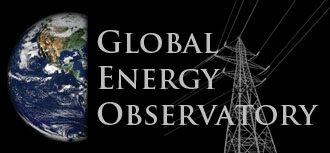About Us
This project was conceived and developed by
Rajan Gupta and Harihar Shankar. Dr. Gupta
is a fellow of Los Alamos National Laboratory and a theoretical
High Energy physicist. Harihar Shankar is a Research and Development Engineer at
Los Alamos National Laboratory. The implementation of the
database and web interface was done in collaboration with
Monika Bittman, Linn Collins, David Daniel, Fernando Gonzalez, Parthiban Jayabal,
Katherine Norskog, Ratheeshprabhu Rajendran and Aswin Venkata. This
project is supported by a much
larger and growing group of collaborators who have a deep interest in global
development and in the energy-development-environment-climate challenge. Our belief
that complex systems, that are driven by highly leveraged social,
political, economic, environmental, technology and resource
availability factors, require informed public participation for
transformational change motivates us to support this site and data
bases. Our hope is that open source information and analysis will
lead to trust and transparency through informed discussion that will result in responsible action.
Our goal is to help accelerate all three aspects of the global energy challenge
- Access to affordable energy by the global population,
- Moving our energy systems to carbon neutral ones, and
- Achieving these in environmentally responsible and economically viable ways.
The New Mexico Consortium carries out research and education in the public interest:
we seek to integrate the strengths of New Mexico's research universities and build
strategic connections with scientific institutions throughout the world.
Background
Access to cheap carbon-neutral energy is essential for human
development, management of the environment, and for sustaining modern
industrial societies. Along with clean water, health care and
education, the need for environmentally friendly carbon neutral energy
that all peoples of the world can access is urgent. The existing
energy infrastructure is enormous and extremely complex. Information
on it is fragmented, incomplete, conflicting and often
proprietary. Even as trained scientists we have found it very
difficult to get our arms around the challenges, much less develop
strategies for enlarging the current energy systems in environmentally
responsible and carbon neutral ways. As a first step towards better
understanding of the challenges facing us we are providing
geo-spatially referenced information on the current system. Our goal
is to to carry out analyses of possible scenarios for development
by engaging the experts and the public simultaneously.
Strategy
The first step towards these goals is to appreciate how vast and
complex the existing energy infrastructure is, and to understand how
it works. We believe that, today, this herculean task is possible
using the fast evolving open software tools (like Google, Google
Earth, Web 2.0, Wikipedia, etc.) and a community effort.
This site represents our efforts to collect, collate and organize the
vast amount of information available through open sources and to
provide it to the global population as an open platform for
fostering discussion and development.
We believe that to transition a system as complex as the coupled
energy, water, environment and climate systems, each of which have
multiple social, political, economic, resource and technology drivers,
to a carbon-neutral, environmentally responsible one requires millions
of people thinking and making contributions.
Education and Outreach
A major focus of this effort is educational. To facilitate this we are
making all the data available so that anyone with access to the
internet can view, edit and enhance existing data stored in a MySQL
database. We are particularly interested in working with high schools
and colleges to build a curriculum on energy systems using these data
and tools. Model projects are being developed in collaboration with
a number of Universities:
- Graduate School of Education, University of California, Berkeley:
Profs. Michael Ranney, Stanley Klein, Bernard Sadoulet, and David Zilberman.
- Department of Electrical and Computer Engineering,
University of New Mexico: Profs. Chaouki Abdallah,
Greg Heileman and Ramiro Jordan.
- Physics Department,
Carnegie Mellon University: Prof. John Negle
- Physics Department,
York University, Canada: Prof. Carl Wolfe
 Global
Energy Observatory
is licensed under a Creative
Commons Attribution 3.0 United States License.
Global
Energy Observatory
is licensed under a Creative
Commons Attribution 3.0 United States License.
